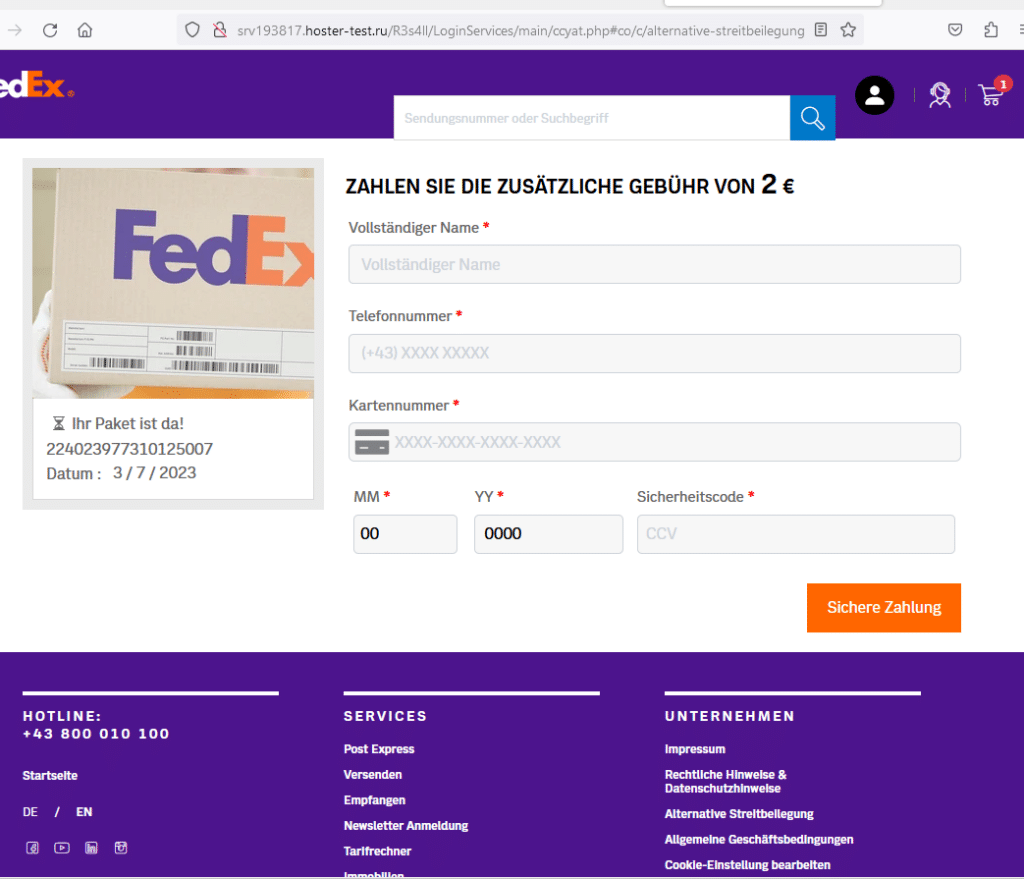Then an email arrives, the sender appears to be FedEx and you breathe a sigh of relief: Finally, the package is here! But – and now comes the catch – what if it’s not FedEx writing?
Imagine receiving an email that looks like it came directly from FedEx, one of the largest international parcel delivery companies. It contains friendly phrases like “Your package is waiting for you” or “All we need is your instructions.” All you have to do is click on a small link and pay a seemingly insignificant fee of 2 euros. Sounds harmless, right?
It's this current fake email from FedEx!
The email as text:
“Your package is waiting for you. Your local FedEx package is still waiting for instructions from you. Dear customer, as a reminder: FedEx informs you that your shipment AT No. 224023977310125007 is still waiting for instructions from you. Confirm the information & payment of the home delivery costs (2.00 euros) and the dispatch of the package by clicking on the following button Arrival at the FedEx Origin facility: 06/30/2023. Track my package”

But wait a minute! This email, as harmless as it may seem, contains a deep and dangerous trap. But how do you recognize them?
The Wolf in Sheep's Clothing: What happens when you click the link?
Let's imagine this: you click on the link in the email and land on a page that looks exactly like the real FedEx page. You enter your name and credit card details and think that's it, the package is on the way. But now comes the kicker: While you think you're giving your data to FedEx, you're actually sending it straight into the arms of the fraudsters. Pretty sneaky, right?

What fraudsters do with your data
You may be wondering: What happens to my data? Unfortunately, the answer is as simple as it is frightening. Fraudsters can essentially go on a shopping spree with your credit card details. You can order expensive goods, subscribe to online services and increase your account balance. And it gets even worse.
It's not just your finances that are at stake. Your identity can be stolen, false accounts can be opened in your name, and your reputation can be permanently damaged. This can lead to long-term financial and legal problems that cannot simply be dismissed with an “Oh, we’ll be fine.”
The better way: How to protect yourself from the scam
- Be skeptical : A healthy skepticism can work wonders. Always remember that companies like FedEx typically do not request personal information or payments via email.
- Verify the source : Before clicking a link in an email, verify the sender's email address. Fraudsters often hide behind slightly modified addresses that look legitimate at first glance.
- Protect your data : Never enter your personal information without verifying the authenticity of the request. Only use websites with secure, encrypted connections for online transactions.
Have you ever received such fake emails?
I bet some of you have received an email like this before, right? It's amazing how ingenious and sophisticated scammers are these days. This is precisely why it is so important to be vigilant and keep your eyes open.
Here you can find our current phishing warnings
Also read:
The Invisible Bait: How Facebook Scammers Abuse Your Feelings and Trust
Notes:
1) This content reflects the current state of affairs at the time of publication. The reproduction of individual images, screenshots, embeds or video sequences serves to discuss the topic. 2) Individual contributions were created through the use of machine assistance and were carefully checked by the Mimikama editorial team before publication. ( Reason )

